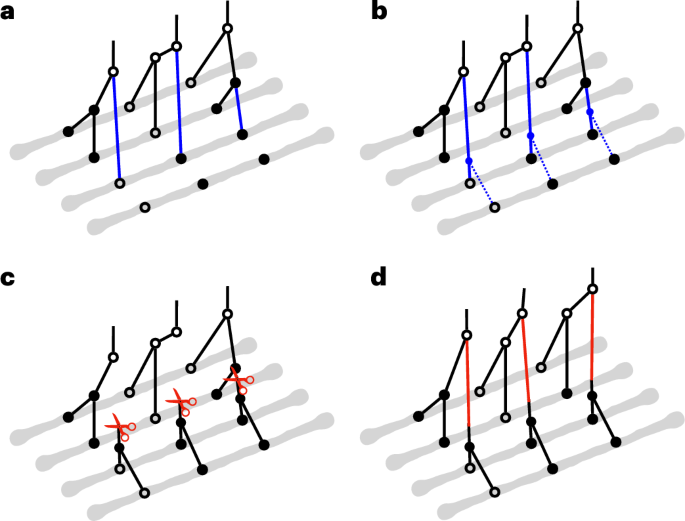数百个基因组的全基因组谱系的稳健和准确的贝叶斯推断
IF 29
1区 生物学
Q1 GENETICS & HEREDITY
引用次数: 0
摘要
祖先重组图(ARG)描述了基因组样本的谱系历史,是种群基因组学和生物医学研究的重要工具。最近的进展大大提高了ARG重建的可扩展性,但它们依赖于可能降低准确性的近似值,特别是在模型规格错误的情况下。此外,他们只重建了一个单一的ARG拓扑结构,无法量化与ARG推断相关的相当大的不确定性。在这里,为了解决这些挑战,我们引入了SINGER(重组谱系的采样和推断),这是一种将ARG采样从后向分布加速两个数量级的方法,能够对数百个全基因组序列进行准确的推断和不确定性量化。通过大量的仿真,我们证明了与现有方法相比,SINGER对模型错误规范的准确性和鲁棒性有所提高。我们通过将SINGER应用于1000基因组计划中的英国和非洲后裔个体,证明了它的实用性,识别了种群分化、古代渗入的信号,并有力地支持了灵长类动物共有的人类白细胞抗原区域的古代多态性。本文章由计算机程序翻译,如有差异,请以英文原文为准。


Robust and accurate Bayesian inference of genome-wide genealogies for hundreds of genomes
The Ancestral Recombination Graph (ARG), which describes the genealogical history of a sample of genomes, is a vital tool in population genomics and biomedical research. Recent advancements have substantially increased ARG reconstruction scalability, but they rely on approximations that can reduce accuracy, especially under model misspecification. Moreover, they reconstruct only a single ARG topology and cannot quantify the considerable uncertainty associated with ARG inferences. Here, to address these challenges, we introduce SINGER (sampling and inferring of genealogies with recombination), a method that accelerates ARG sampling from the posterior distribution by two orders of magnitude, enabling accurate inference and uncertainty quantification for hundreds of whole-genome sequences. Through extensive simulations, we demonstrate SINGER’s enhanced accuracy and robustness to model misspecification compared to existing methods. We demonstrate the utility of SINGER by applying it to individuals of British and African descent within the 1000 Genomes Project, identifying signals of population differentiation, archaic introgression and strong support for ancient polymorphism in the human leukocyte antigen region shared across primates. SINGER is a method for creating ancestral recombination graphs to understand the genealogical history of genomes. The method has increased speed, and thus scalability, without sacrificing accuracy.
求助全文
通过发布文献求助,成功后即可免费获取论文全文。
去求助
来源期刊

Nature genetics
生物-遗传学
CiteScore
43.00
自引率
2.60%
发文量
241
审稿时长
3 months
期刊介绍:
Nature Genetics publishes the very highest quality research in genetics. It encompasses genetic and functional genomic studies on human and plant traits and on other model organisms. Current emphasis is on the genetic basis for common and complex diseases and on the functional mechanism, architecture and evolution of gene networks, studied by experimental perturbation.
Integrative genetic topics comprise, but are not limited to:
-Genes in the pathology of human disease
-Molecular analysis of simple and complex genetic traits
-Cancer genetics
-Agricultural genomics
-Developmental genetics
-Regulatory variation in gene expression
-Strategies and technologies for extracting function from genomic data
-Pharmacological genomics
-Genome evolution
 求助内容:
求助内容: 应助结果提醒方式:
应助结果提醒方式:


